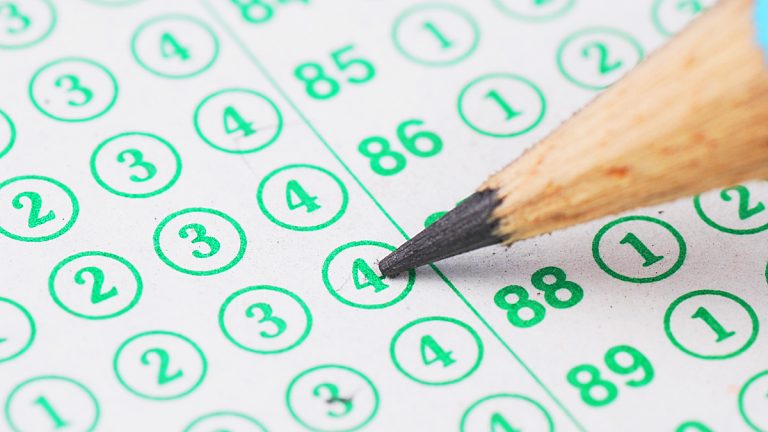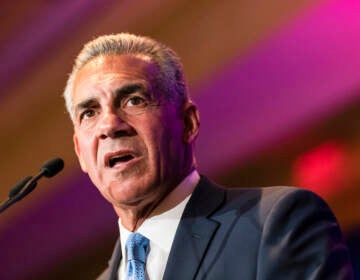Embattled teacher unions to go after ‘toxic testing’

National Education Association (NEA) President Lily Eskelsen García on the use of student test scores to evaluate teacher effectiveness:
They’re “the mark of the devil.” “For us, one thing is clear. Before anything is going to get better: It’s the Testing, Stupid. Better yet, it’s the stupid testing.”
New Jersey Education Association (NJEA) Vice President Marie Blistan on the use of student test scores to evaluate teacher effectiveness:
“We need to safeguard against a test-taking tsunami that enriches private corporations’ wallets but impoverishes our students.”
Denver, the site of the NEA’s annual meeting last week, is a long way from Trenton but you’d never know it from the sound bites.
During this past year the rhetoric from both the national teacher union leadership and N.J.’s state chapter have grown progressively more rancorous. The bicoastal target of ire is, ostensibly, the practice of linking student test scores to teacher evaluations.
What a difference a few years make. In 2011, former NEA President Dennis Van Roekel eagerly supported Barack Obama’s re-election despite the President’s support for teacher accountability. In fact, NEA was the first labor union to endorse the President for his second term.
In 2012 NJEA saluted N.J.’s new tenure and teacher evaluation reform legislation, which aligns with Pres. Obama’s vision and includes strong accountability measures. Then-NJEA President Barbara Keshishian gushed, “The evolution of this law is a blueprint for effective public policy. Every key stakeholder – principals and supervisors, school boards, legislators, the state Department of Education, and NJEA – worked hard to bring it over the finish line.”
What’s changed?
Both labor organizations see blood in the water trickling from politicians who support education reform agendas. Pres. Obama’s approval rating is down to 42 percent and the GOP may take over the Senate.
Last week in Colorado 9,000 NEA delegates passed a resolution calling for the resignation of U.S. Education Secretary Arne Duncan. The passage of the resolution is remarkable not only for its hostility towards the President and Duncan, his appointee, but also because NEA has always embraced Democratic presidents, ever since it first endorsed Jimmy Carter back in 1976. Yesterday, the New York Times called the Duncan resolution a “watershed between the Democratic Party and teachers’ unions.”
On this side of the Mississippi, Chris Christie is also suffering from (self-inflicted) blood loss. Today the N.J. Senate, inhaling his aura of weakness, is poised to approve an NJEA-backed bill (see last week’s post) that would delay by two years the implementation of our data-driven teacher evaluations. NJEA has scheduled Lobby Days to “protect public education” and the “fair implementation of new teacher evaluation system and new standardized tests.” (Christie may try to outfox the Senate through an Executive Order, but either way his education agenda, not very different from Pres. Obama’s, is taking a hit.)
In May the Newark Teachers Union demanded Newark Superintendent Cami Anderson’s resignation, a harbinger of the NEA’s condemnation of Arne Duncan.
Fired up and ready to go! In a widely-read column at Fordham’s Flypaper blog, former N.J. Deputy Commissioner Andy Smarick described the tone of the NEA Colorado meeting as “positively martial.” The same could be said of NJEA’s stance. The heightened militancy is aided by the growth of pugnacious splinter groups like the Badass Teachers Association that applaud increased defiance.
Ironically, this heightened hostility from the national union and state chapters is taking place at a time when teacher unions, once one of America’s most powerful lobbies, are facing greater vulnerability. Their blood is in the water too. Recent examples of these threats to teacher union power include the Los Angeles County Court decision (California v. Vergara; see this post) that undermined teacher tenure and a Supreme Court decision issued at the end of June that allows home health aides in Illinois to not join NEA or pay union dues. . (Both NEA and AFT represent some non-school employees.)
Grim union leaders watch downward membership trends: NEA has lost a quarter of a million members over the last five years and 7 percent in membership dues. Unions also fear the growing popularity of charter school among students and parents because that growth diminishes their market share. Also, charter school teachers don’t have to unionize and, thus, pay membership dues.
If crisis really is an opportunity, then teacher unions should provide substantive ideas rather than rancor. There are no devils or tsunamis here, protestations to the contrary. If union leaders don’t like the new standardized testing, then offer new strategies that provide accountability and enhance student learning. Enough with the bloodletting. It’s time to focus on student learning.
___________________________________________
Laura Waters is president of the Lawrence Township School Board in Mercer County. She also writes about New Jersey’s public education on her blog NJ Left Behind. Follow her on Twitter @NJLeftbehind.
WHYY is your source for fact-based, in-depth journalism and information. As a nonprofit organization, we rely on financial support from readers like you. Please give today.





